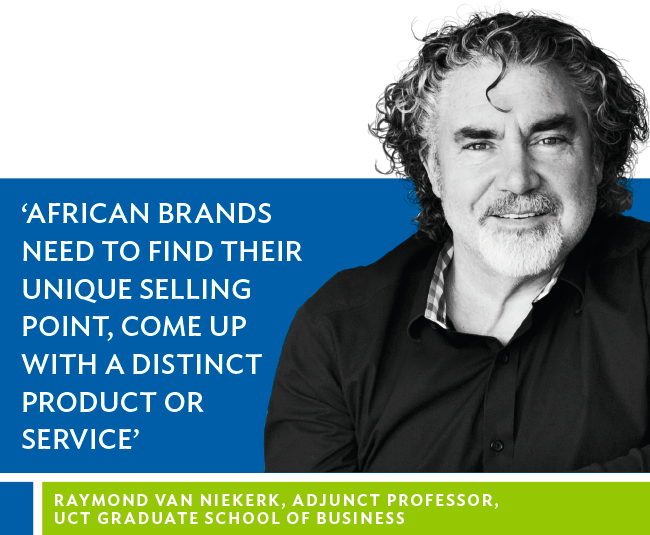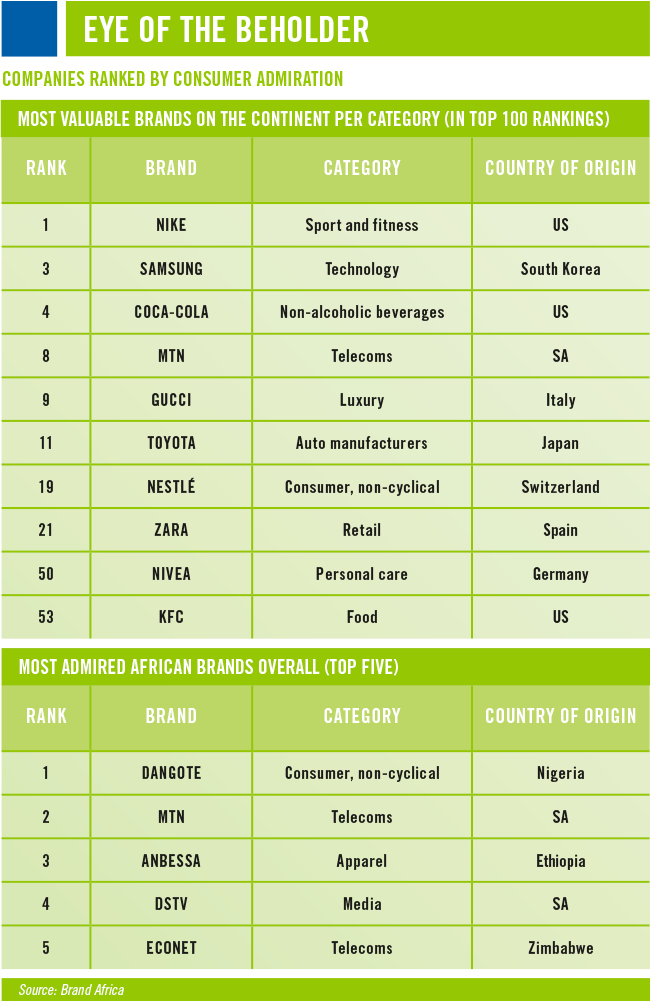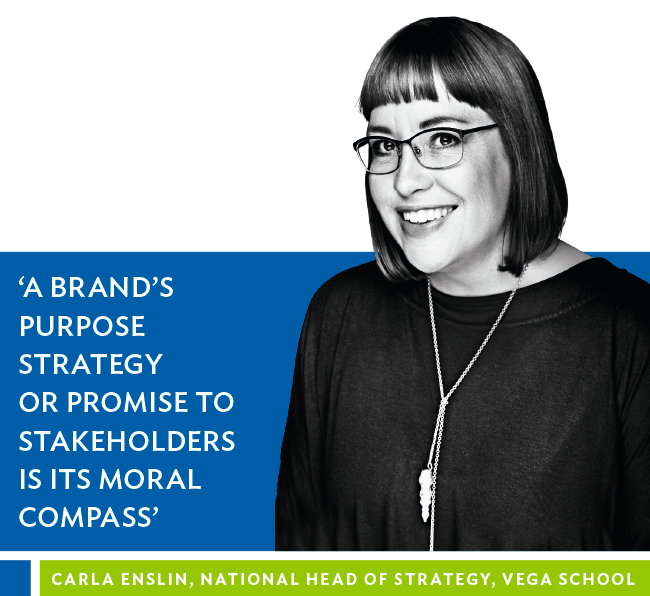When Beyoncé attended a New York premiere wearing a monochromatic coat by Kisua, the African fashion brand was catapulted into the global spotlight. The coat sold out. And the US singer went further by endorsing the label with an Instagram post of herself in a patterned blue ‘Mombasa’ skirt by Kisua. ‘This is what you dream about as a local brand: a big celebrity or Hollywood star endorsing your brand and thereby increasing its desirability,’ says Raymond van Niekerk, brand builder and adjunct professor at the UCT’s Graduate School of Business. ‘On this continent we’ve been brainwashed to aspire for an American lifestyle and tend to perceive the major international brands as better than local ones.’
So it’s hardly surprising that global brands dominate the seventh annual Brand Africa 100: Africa’s Best Brands survey, which was revealed at an event hosted by the JSE in May 2019. For the second year running, US sports and fitness brand Nike came up as the number one brand in Africa in terms of being spontaneously recalled by consumers – followed by Adidas (Germany), Samsung (South Korea) and Coca-Cola (US). The Geopoll survey used a mobile platform to gather more than 15 000 brand mentions via SMS from consumers in 25 countries in Africa.
MTN emerged as the highest-ranking African entry. The SA teleco operates in more than 20 African markets and placed eighth in the Top 100 (two places lower than in 2017/18). This year’s local ‘climbers’ are Ethiopian shoe manufacturer Anbessa, which rose 11 positions to 12 out of 100, and Zimbabwean telecoms firm Econet, which climbed nine places to 31. The only new African (re-)entrants in the Top 100 are SA retailer Pick n Pay at 84 and Nigeria’s Jumia, Africa’s largest e-commerce firm, which listed on the New York stock market in April and entered the Top 100 at 74.
However, most of the leading African brands have lost some footing since the previous year: Nigerian consumer group Dangote dropped four places to 25; Nigerian telecoms firm Glo slipped six to 30; at 47, SA consumer group Tiger Brands is 15 down; SA retailer Shoprite comes in at 52, 14 places adrift of its previous ranking; and number 69, Kenyan beer brand Tusker, tumbled 28 places. ‘Facing renewed investment by non-African brands, Africa’s share of the most-admired brands has been rapidly declining over the past three years from a high of 25% in 2013/14 to a low of 14% this year – down from 17% in 2017/18,’ according to Thebe Ikalafeng, the founder and chairman of Brand Africa and Brand Leadership Group. ‘It is disappointing that despite its vibrant entrepreneurial environment, Africa is not creating new competitive brands to meet the needs of its growing consumer market, which is estimated by McKinsey & Co to grow by $400 billion by 2020.’
He adds that ‘these rankings are an important metric of and challenge for creating home-grown competitive African brands that will transform the African promise and change its narrative and image as a competitive continent. African brands have an important role in helping to build the African brand’.
The continent, however, already has some trusted, strong brands that dominate in their regional markets. One of these is Dangote – the powerful industrial conglomerate probably best known for its cement – which was named the top Most Admired African Brand when respondents were asked specifically to name an African brand. ‘We fervently believe that only Africans can develop Africa, and this gives us a stronger sense of relevance in all the countries where we have our operations,’ says Anthony Chiejina, group chief corporate communications officer at Dangote. ‘We are touching lives by providing their basic needs and empowering Africans more than ever before – creating jobs, reducing capital flight [and] helping government conserve foreign exchange drain by supporting different industrial infrastructural projects of African government,’ he says. ‘We keep our brand promise and stay authentic.’
Authenticity, trust and local relevance are crucial for creating a strong brand – especially in an age of social media and rapid tech advancements where corporate reputation can be destroyed with a Twitter or Facebook post. ‘A brand’s purpose strategy or promise to stakeholders is its moral compass,’ says Carla Enslin, co-founder and national head of strategy at Vega School. ‘In this endeavour, leadership and management determine the true direction and thereby enable and inspire the entire organisation to participate in and co-lead brand-building.’
While such corporate governance challenges affect brands across the globe, Wesley Fredericks, MD of Red & Yellow Creative School of Business, says that Africa needs to demonstrate how local contexts are universally applicable. ‘Local brands need to think creatively about the real issues Africans are facing, and develop products or services that address the human responses to these challenges or frustrations,’ he says. ‘In order for African brands to reach the status of a Nike, Samsung or Coca-Cola, they need to think beyond the current borders. Have global aspirations. We have so much to offer the world and we need to realise that we have the opportunity to offer our unique “African magic” beyond our immediate borders.
‘Focus on making the emotional connection with a pervasive human situation, regardless of whether you live in Thailand, Timbuktu or Tanzania,’ he says. ‘A brand wins us over by inviting us into its story and eliciting emotional responses. African brands have stories to tell. Authentic stories. We must learn to tell these stories in ways that are compelling. What successful global brands got right is that they not only produce great products, but that they also manage to elicit emotional responses from African customers.’
Fredericks names SA chicken restaurant chain Nando’s as an example of an authentic brand that has made it big at home and internationally. ‘Looking at Nando’s, it becomes abundantly clear that we shouldn’t be trying to “emulate”, but rather “originate”.’
Van Niekerk gives similar advice: ‘You can’t out-Nike Nike or out-Samsung Samsung.’ The top global brands have great products backed by gigantic expertise in marketing and distribution, against which new or small brands simply cannot compete, he argues. ‘That’s why African brands need to find their unique selling point, come up with a distinct product or service that offers something very different, because otherwise the customers will resort to their tried and trusted brands.’
Mike Abel, CEO and founding partner of advertising agency M&C Saatchi Abel, says that local brands such as Bos Ice Tea (derived from ‘bos’ as in rooibos) have successfully carved a unique space into an otherwise category-like offering. ‘Bos has brought designer cool into the iced-tea category,’ he says, adding that some local brands have elevated themselves to international stardom through having the right mix of the following three ingredients: to be more relevant, more resonant and to offer better value.
‘In financial services, brands such as Standard Bank have conquered the continent and are exceptionally trusted and aspirational beyond South Africa’s borders,’ says Abel. ‘We are early adopters here, so new tech finds a willing audience and with almost 100% smartphone penetration, it’s a savvy market. Similarly, Discovery Vitality has succeeded way beyond our borders because of a smart bouquet of benefits not offered by competitors.’
And again, Nando’s is mentioned as an example of local and international brand success, having built a peri-peri chicken empire that covers nearly 1 200 restaurants in 23 countries, including seven in sub-Saharan Africa. ‘There is no compromise in buying Nando’s as the quality and unique flavour, combined with a highly compelling brand personality, makes it desirable,’ says Abel, whose firm is behind some of the chain’s quirky, socially relevant campaigns (#RightMyName; #YouPeople).
The restaurant chain is famous for its clever, humorous marketing and its commercial success is often attributed to the philosophy that Nando’s isn’t primarily about the chicken but about ‘the people who make the chicken’. Nando’s also has other key ingredients for success in place: stock availability and distribution infrastructure. This is a challenge in Africa, where consumers frequently can’t get hold of what they want. ‘It is often assumed that price is the biggest barrier that gets in the way of people buying the brands they want,’ according to research firm Ipsos. ‘In sub-Saharan Africa, however, the single biggest barrier impacting on purchase behaviour is related to accessibility. Market forces such as stock availability, limited ranges, expensive prices and limited or non-existent promotional activities can prevent people from buying the brands they want and push them towards alternative brands.’
Ipsos advises brand owners to fully understand the channels of choice in specific African markets and customise their distribution activities and stock management accordingly. They need to be aware of the practicalities of daily life in Africa. It points out that ‘cleaning agents might require water for effective use; however, water isn’t always accessible or available “on tap”’. In addition, ‘complicated loan approval processes may heavily influence the uptake of products in the financial sector; products not being available cold due to lack of refrigeration or electricity may seriously impact confectionery brands as well as beverage brands; and not having enough payment options in retail outlets are all very real factors outside of the conventional in-market factors we observe in the developed world’.
The ongoing efforts by the AU to remove regulatory restrictions, such as the Single African Air Transport Market and the African Continental Free Trade Agreement, will make inter-African trade easier, according to Brand Africa founder Ikalafeng. He argues that these initiatives ‘will create an enviable market opportunity for African entrepreneurs to collaborate and create pan-African brands that can compete with non-African brands. If African brands do not take the opportunity, African brands will continue to decline in preference among African consumers’. Ikalafeng stresses that to achieve ultimate economic independence, Africa must adequately and fairly serve and compete for a larger share of its own consumer base. And this begins with believing in home-grown African brands and supporting them – without needing global endorsement.
Ikalafeng recently told a TV interviewer that Kisua was a strong African clothing brand that could hold its own with global fashion houses and that it shouldn’t matter whether stars such as Beyoncé were wearing it or not. He says something that local brands and consumers should take to heart: ‘We’re always looking for affirmation from somebody outside of Africa to tell us it’s good to be African. But it has always been good to be African.’












